
Saga Prefecture (佐賀県) is a small and rustic prefecture on the island of Kyushu in Japan. It is famous for pottery and pre-historic village ruins.
Understand
[edit]Saga is the smallest among the seven prefectures in Kyushu. The prefectural government is in Saga City. It faces Genkainada to the north, the Ariake Sea to the south, and is topographically divided into the Seburi mountains in the north, the Saga plains in the south, the hilly areas in the west, and the Dara mountains.
History
[edit]The remains of the ancient Japanese Yayoi period remain and are designated as Yoshinogari Historical Park. This is the first place in Japan where rice was cultivated. Saga Prefecture is a place with deep ties to Baekje in Korea, and the five-gyeong doctors of Baekje visited this place to deliver Baekje's cultural relics. Kakarashima, located in Karatsu, Saga Prefecture, is also known as the birthplace of King Muryeong of Baekje. The remains of the place where Toyotomi Hideyoshi built Nagoya Castle in Karatsu during the Japanese Invasion of Korea and Japanese troops left the site at that time.
Read
[edit]- My Gabai Grandma from Saga (佐賀のがばいばあちゃん) by Yōshichi Shimada (ISBN 4198928320, or ISBN 4198920001 in Japanese) - a biography novel depicts the life of early Postwar Japan in Saga. It has been adapted into movies and manga that were once popular in Japan. Worth a read if you are traveling Saga.
Tourist information site
[edit]Asobo Saga is the prefecture's official Japanese-only guide site with integrated Google Translate. Its Pamphlets section has some materials in English and other languages.
Cities
[edit]There are ten cities in Saga Prefecture:
Other destinations
[edit]
Get in
[edit]By plane
[edit]Saga International Airport serves the prefecture with international arrivals from Seoul, Xian, Shanghai, and Taipei along with domestic flights from Narita and Tokyo's Haneda Airport. Nagasaki Airport and Fukuoka International Airport are viable options that are often preferable, because they serve a much wider variety of destinations.
By train
[edit]Shin-Tosu Station in Tosu is the only stop in Saga along the Kyushu Shinkansen, where visitors can transfer to the Nagasaki Line. For those traveling to Karatsu, the subway line in Fukuoka connects to the JR Chikuhi Line at Meinohama Station. Many of the subway trains actually travel along the JR line to Chikuzen-Maebaru Station before a transfer is necessary.
From Nagasaki, the Nishi-Kyushu Shinkansen has stops at Ureshino and Takeo Onsen Station in Takeo with plans to meet the Kyushu Shinkansen at Shin-Tosu Station.
Get around
[edit]See
[edit]
- Wander the grounds of Mifuneyama Garden below Mount Mifune (Takeo)
- Learn about the lives and culture of ancient Japan in one of the largest recreated Jomon villages (Yoshinogari)
- Stroll around the scenic pottery village of Okawachiyama (Imari)
- Marvel at the beauty of Yutoku Inari Shrine (Kashima)
- See the sunset at the rice terraces overlooking the Sea of Japan in Genkai
- Visit Saga Castle and its reconstructed palace, the largest wooden castle building in the nation (Saga)
- Visit Arita Porcelain Park to see its porcelain Zwinger (Arita)
Do
[edit]- Karatsu Kunchi (唐津くんち). Held at the beginning of November in Karatsu City. This is Saga's most famous festival and attracts around 1 million visitors every year.
- Imari Ton-Ten-Ton Festival (伊万里トンテントン祭り) (In Imari City). Held for 3 days every year near the end of October. The festival is one of the three great fighting festivals in Japan. In the festival a crashing battle takes place between the two huge portable shrines, the Ara-mikoshi and the Danjiri. The name "Ton-Ten-Ton" represents the sound of drums used in the festival.
- Kashima Gatalympics. Held every May in a small town called Hama, near Kashima City. This event involves playing a variety of sports in the mudflats of the Ariake Sea.
- Saga International Balloon Fiesta. Held at the beginning of November every year just outside of Saga City along the Kase River. This is a very popular event and attracts competitors from all over the world.


